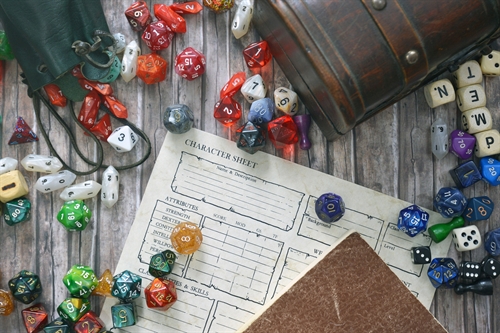With the release of D&D5e tabletop and roleplaying games (RPGs) have seen a resurgence in popularity. Although you can play D&D with a few PDFs and a dice app on your phone… where’s the fun in that? Like many hobbies, RPGs have plenty of kit – from miniature figures to hefty rule books (and their supplements) to elaborate scenery models… And all this kit needs to be stored when not in use.
Can you play D&D on your phone?
As mentioned above, it is possible to play a minimalist RPG, no figurines or scenery, just your imagination – and there are players and games masters who prefer this. It can be easier to use the search function to quickly browse a PDF than it is to leaf through a book. And you can certainly reduce the amount of plastic in the world by using a dice app. Google will even give you a result if you ask it to roll D20.
This will, of course, save you space and money, but if you enjoy the physical aspects of gaming there is no shame in owning the kit that makes you happy.
Storing RPG minis
For minis you need a system that will hold your RPG figures in place and protect them from knocks. This is particularly the case if you have painted them. Don’t forget that you may need to transport them to a gaming venue. Boxes with foam padding work well, but some gamers opt for a magnetic storage system. To learn more about the various options, try this post on storage from Haximica miniature painting.
Storing scenery for tabletop gaming
It may be tempting to display your scenery, but resin models are vulnerable to bumps and knocks, so make sure it is not in the way of your daily activities. You’ll also need to dust it from time to time (although for some gaming scenarios dust might add to the atmosphere). Models may also suffer from exposure to light. Consider investing in a glass case or cabinet to protect your scenery pieces. Or if you must have them out in the open rotate your display, putting some away from time to time. The boxes your scenery came in are a good bet or use plastic storage tubs (ice cream and margarine tubs are great) and sturdy cardboard boxes. Don’t forget to label everything – nothing is more frustrating than knowing you own the perfect piece for a gaming scenario but not being able to find it.
Mats and maps can usually be rolled up when not in use. You could also place a piece of Perspex over them if the table is needed for other things when it’s not games night.
Storing roleplaying rule books
A good collection of gaming systems and supporting material can be a joy: most gamers do not play everything they own, but they use it for inspiration. A sturdy bookshelf is ideal for storing the guidebooks, manuals and rule books that you need for successful roleplaying. Many supplements, however, are flimsy and may do better in magazine boxes or folders.
You may have written records of your gaming sessions that you want to keep, too. Consider whether these would be more useful scanned in and kept along with photos of your gaming triumphs. Our post on storing papers and photos might give you a few ideas about this.
Transporting your roleplaying gear
It’s usual to travel to play, so think about how to transport figures, scenery and paperwork. A gaming bag with dice, notebook and character sheet is a good start, but kit-loving games masters may want a wheeled case or trunk. This can, of course, be used for storage, too.
Is your hobby taking over your home?
If you find that your collection of gaming kit is taking up too much space, or that it gets damaged because you have to keep it in your living spaces, consider taking it out of your home and into storage. You will not be playing all the systems you own at all times, so keep the current favourite accessible and put the others away in a self-storage unit.
It’s worth making up an inventory to help you remember what you have, and where it is. Also keep note of the costs to replace for insurance purposes. This may also help you to keep your spending on the hobby under control.
Insuring your roleplaying kit
Gaming gear stored at home should be covered by your contents insurance – but that cover may not extend to a storage unit. Self-storage insurance is usually mandatory when you rent the unit and many storage companies do have insurance. However, you don’t have to take up the storage company’s insurance offering. If you shop around you can get a better deal on self-storage insurance. For a start, get a quote from us at Store and Insure.


